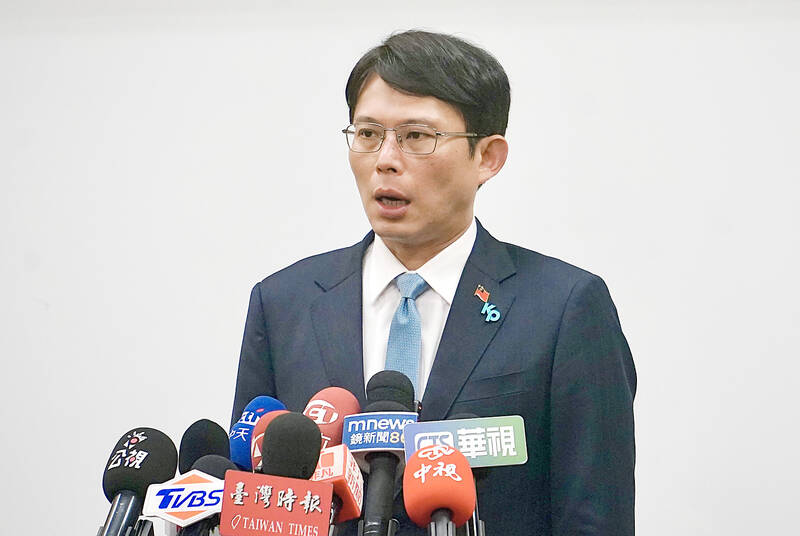Acting Taiwan People’s Party (TPP) Chairman Huang Kuo-chang (黃國昌) yesterday won the party’s chairmanship by-election, defeating his opponent Tsai Pi-ru (蔡壁如) by a landslide.
The by-election took place yesterday from 9am to 4pm through an online voting, and Huang’s win was announced at 4:15pm.
Huang won 8,903 votes, or 96.11 percent of the total, while Tsai garnered 360 ballots, or 3.89 percent.

Photo: CNA
The voter turnout was 47.95 percent, or 9,263 people out of the 19,320 who were eligible to vote, the party headquarters said.
Following his huge win, Huang would serve as leader of Taiwan’s second-largest opposition party until Dec. 31 next year, when the second four-year term of his predecessor, former party chairman Ko Wen-je (柯文哲), was slated to end.
Ko resigned earlier last month, as he is still being held in detention as part of an ongoing investigation into the Core Pacific City (京華城購物中心) redevelopment corruption case.
Expressing gratitude to party members for their support, Huang promised to work hard.
Amid competition from the Democratic Progressive Party and the Chinese Nationalist Party (KMT), Huang said he would lead the growth of the TPP to meet the expectations of Taiwanese for a grassroots political party.
He urged all TPP members to unite and help make Ko proud.
The party was founded by Ko in 2019. He at the time said the party aimed to change Taiwan’s political culture, as the ideological battle between the two major parties left the nation in a rut and led to friction over the past two decades.
Huang, a legal academic, rose to prominence through civic activism, including his participation in the 2014 Sunflower movement.
Huang later joined the New Power Party and became its first executive chairman in 2015. The following year, he was elected to the legislature.
In 2020, Huang did not seek re-election as a legislator, and started to advocate for whistle-blower protection laws. Ko in 2023 invited Huang to join the TPP, and the following year, Huang became a TPP legislator-at-large.
Before Ko resigned as TPP chairman, he endorsed Huang, giving Huang a boost within the mainstream faction of the party.

Taiwanese can file complaints with the Tourism Administration to report travel agencies if their activities caused termination of a person’s citizenship, Mainland Affairs Council Minister Chiu Chui-cheng (邱垂正) said yesterday, after a podcaster highlighted a case in which a person’s citizenship was canceled for receiving a single-use Chinese passport to enter Russia. The council is aware of incidents in which people who signed up through Chinese travel agencies for tours of Russia were told they could obtain Russian visas and fast-track border clearance, Chiu told reporters on the sidelines of an event in Taipei. However, the travel agencies actually applied

New measures aimed at making Taiwan more attractive to foreign professionals came into effect this month, the National Development Council said yesterday. Among the changes, international students at Taiwanese universities would be able to work in Taiwan without a work permit in the two years after they graduate, explainer materials provided by the council said. In addition, foreign nationals who graduated from one of the world’s top 200 universities within the past five years can also apply for a two-year open work permit. Previously, those graduates would have needed to apply for a work permit using point-based criteria or have a Taiwanese company

The Shilin District Prosecutors’ Office yesterday indicted two Taiwanese and issued a wanted notice for Pete Liu (劉作虎), founder of Shenzhen-based smartphone manufacturer OnePlus Technology Co (萬普拉斯科技), for allegedly contravening the Act Governing Relations Between the People of the Taiwan Area and the Mainland Area (臺灣地區與大陸地區人民關係條例) by poaching 70 engineers in Taiwan. Liu allegedly traveled to Taiwan at the end of 2014 and met with a Taiwanese man surnamed Lin (林) to discuss establishing a mobile software research and development (R&D) team in Taiwan, prosecutors said. Without approval from the government, Lin, following Liu’s instructions, recruited more than 70 software

Chinese spouse and influencer Guan Guan’s (關關) residency permit has been revoked for repeatedly posting pro-China videos that threaten national security, the National Immigration Agency confirmed today. Guan Guan has said many controversial statements in her videos posted to Douyin (抖音), including “the red flag will soon be painted all over Taiwan” and “Taiwan is an inseparable part of China,” and expressing hope for expedited reunification. The agency last year received multiple reports alleging that Guan Guan had advocated for armed reunification. After verifying the reports, the agency last month issued a notice requiring her to appear and explain her actions. Guan